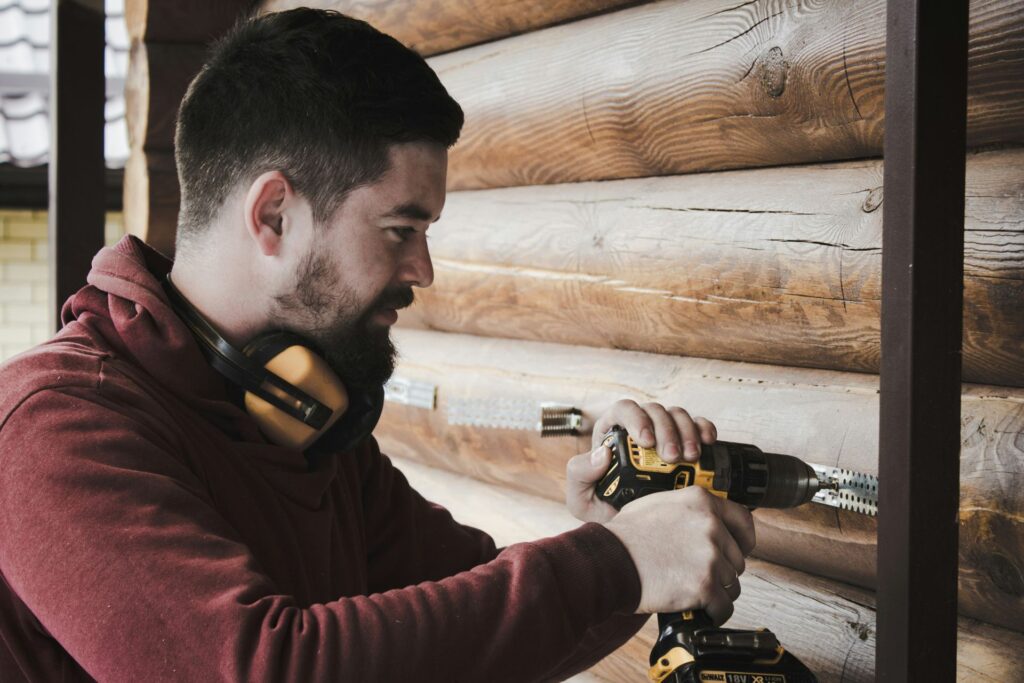
We are reader-supported. When you buy through links on our site, we may earn an affiliate commission.
You’ve decided that you want to work with your hands and build things. The construction industry is booming in the United States, and you can make great money putting your skills to use. Plus, it’s a field with relative stability, as housing development and improvements will always be critical. Now that you’ve settled on your career path, you need to learn how to become a residential contractor.
Ready to learn how to become a residential contractor? We’ll guide you through each step and the variety of options you have before you.
What Is a Residential Contractor?
Before diving into what it takes to become a residential contractor, you should understand what it means to be one. Being a residential contractor means you work solely with homes or residential areas where there are multiple homes being built. You’re there to oversee an entire project from the foundation to the last nail put in the house.
Besides building a home, residential contractors also manage renovations and any other home-related projects. As a residential contractor, you are the sole liaison between the homeowner and the subcontractors you enlist to complete the project.
Additionally, you would be responsible for acquiring permits, supervising the project, scheduling inspections to ensure the safety and stability of the home, solving any problems that arise, and remaining knowledgeable throughout every phase of the project.
Although a career as a residential contractor involves a lot of work, you are there every step of the way and are rewarded by being able to see the project arrive at completion.
Other Types of Contractors
There are many other types of contractors. Below, we’ll list some of the most popular types of contractors and what they do, as well as why you should consider being a residential contractor over the other types.
General Contractor
General contractors are quite similar to residential contractors, but they are not necessarily specialized in building homes or completing home projects. They focus on general repairs and construction work.
Similar to a residential contractor, general contractors tend to hire out other subcontractors to complete a project. However, many general contractors are specialized in a few areas, including basic plumbing, electrical work, carpentry, or other basic construction skills.
There can be confusion when someone thinks of a general contractor. As a “general contractor,” you would have all of the basic construction skills needed for a basic construction or renovation project. However, as a “general contractor,” you oversee an entire project and act as the mediator between the person hiring you and all the people you hire for a certain project.
Specialty Contractor or Subcontractor
As a specialty contractor, you would be hired out by someone who needs a contractor for a specific job within a larger project, or for just a specialized project that isn’t part of a bigger one. Often, people hire subcontractors to cut costs from hiring a general contractor.
Typically, subcontractors are those who may specialize in things like plumbing, electricity, carpentry, painting, and other trades. As a subcontractor, you might be able to work on multiple projects at one time. Say you specialize in painting houses. You could spend a day painting one house, and have a flexible enough schedule to go to another house to work.
Specialty contractors may work with individuals and can be hired by those who aren’t general contractors. You’ll have to juggle your schedule to ensure you can spend time at each project you’re hired for.
Since people generally hire subcontractors to cut costs, you might have difficulty finding work outside of being hired by a general contractor. People realize after talking with specialty contractors that it’s more expensive than they thought. You’ve put in years of work getting certificates and experience, so you are going to charge a price that is a reflection of your work.
Eventually, you may want to work your way up to a general contractor, which is completely doable, but takes years of work. Understand that as a specialty contractor, you usually don’t get paid by a general contractor until your work is complete, so you have to keep an eye on your finances and be wise with your money.
Freelance Contractor
As a freelance contractor, you can work independently and manage your own small business. You have the freedom to choose your own schedule and decide which projects you would like to do. A lot of people and even companies tend to hire freelance workers to save money.
Being a freelancer means you have to run yourself like a business. You would have to think of a business name for yourself, get all of the proper licensing on your own, open a business bank account, and even advertise yourself. You don’t get the luxury of being in an established business. Instead, you would have to work from the ground up and find projects so you can become a reputable source for those looking for a contractor.
You are required to find your own work as well as a freelance contractor. You can’t rely on your manager to find a job for you. While this may appeal to some people, it’s doesn’t always guarantee a paycheck at the end of the day. Residential contractors, on the other hand, are usually hired by a larger company and will almost always have work to do since a majority of the population owns or lives in a home.
Career Prospects for Residential Contractors
In the residential sphere, opportunities abound in a variety of specific trades. BLS data can give glimpse into the wage prospects for contractors. We pay attention to median wage here to provide a more balanced view of yearly earnings; averages tend to be distorted by high or low outliers.
Learn more by checking out our article: How Much Do Contractors Make in a Year?
Brickmason: $53,100
Carpenter: $48,330
Construction Laborer: $36,860
Electrician: $56,180
However, experience also provides opportunities to further increase earnings by pursuing a construction management or entrepreneurship role.
By now, you’re probably sold on the career opportunities in residential contracting. Now, how do you go about turning your dream into a reality?
1. Get Your Training
The proper training will teach you the skills necessary to complete jobs. Many people choose to go to a trade school or university to learn these skills. You can opt for a degree in construction technology or management. One benefit of going through a school program is that many offer a job board upon graduation, helping you find and apply for open positions.
You don’t have to go to school to become a residential contractor, however. You can also get training on-the-job. Look for apprentice positions in your area, or apply for laborer positions where you can work your way up. Ask people with experience in the field to act as your mentor, guiding you through the process.
If you decide to get training on-the-job, however, it will take time for you to work your way up to being a residential contractor. Contractors who have a bachelor’s degree are often sought first. Again, although a degree isn’t needed, you should still find all of the apprenticeships you can. The more experience you gain with a professional, the better off you will be during the job hunt.
2. Get Your Residential Contractor Licensing
Once you have the skills, you’ll need to back them up with paperwork. Most states have a contractor’s licensing board, and you’ll often need to pass an exam to get your license. Check out your area’s laws surrounding this profession to determine what you need to do.
Pennsylvania, for instance, has no state-level license or certification requirements for most construction contractors. However, professionals will still need to get locally licensed and register with the PA Attorney General’s office. In California, on the other hand, all jobs exceeding $500 will require paperwork, and most contractors will need to take and pass an exam.
Along with licensing, you should continue to get your certifications in as many contractor-related topics as you can. You’ll have to study and take exams in order to get certain certifications, which can be challenging to juggle with gaining on-site experience. However, it will make you all the more qualified for a job.
3. Apply for a Job as a Residential Contractor
When you’re ready to seek employment, one option is to work for an already-established company. A few benefits come with this choice, including less paperwork, no need to deal with problem clients and a full arsenal of skilled workers and equipment at your disposal.
Look for open positions on online job boards, such as Indeed and LinkedIn. You can also look for jobs in your local newspaper. If you know of residential construction companies in your area, go on their websites and see if they have any openings available. Another option is to call the business directly and ask about available opportunities.
As a new contractor, you might experience setbacks. Companies want to ensure you have the skills needed to get the job done. Ask construction companies what they would require of you to meet their standards and get hired. Always be yourself in a job interview and be honest about your skills, and understand that you must be willing to learn.
4. Start a Business
If you don’t want to work for someone else, another option is to start your own business.
You’ll want to write up a business plan, a document that should include a description of your company, an outlook of the construction market and how you plan to market your services. This document is essential if you plan to ask for funding from a bank or investors. Financial experts will also want to see revenue projections, or how much profit you expect to make.
Once you pick a business name and location, you’ll need to register your operation with the state. Registration comes with a fee, though the cost varies wildly from area to area. The next step is to hire your team and market your services. Reach out to your local community to let them know who you are and what you do.
There’s a lot of work that goes into starting your own business. Be optimistic and realistic about your goals for your business. You will have to advertise yourself, so be prepared to show real images of work you’ve done so people will hire you.
5. Get a Surety Bond
Once you’re in business, you’ll need to take every step necessary to protect your organization and assets. One way to do this is to get a surety bond. A surety bond is not an insurance policy, though it’s typically offered by an insurance company. It provides financial support to contractors and ensures project completion.
You will pay a fee to have a surety bond provider guarantee your contract with a customer. If something should happen where you can’t complete the project — such as illness or cash flow issues — the guarantor will find someone who can. When you get a surety bond, you can safeguard your company and offer an additional guarantee to your customers.
Some common mistakes people make when obtaining a surety bond is purchasing the wrong bond for the wrong amount, or getting a bond from a non-reputable source. Educate yourself so you know exactly what to get when obtaining a surety bond so you can get your business going and ensure security.
How to Become a Residential Contractor
Are you ready to live up to your dream of becoming a residential contractor? If so, get started today. Look for schools that cater to your chosen field and find a degree that suits your desired goals. If hitting the books isn’t for you, look around for entry-level positions where you can learn skills on-site.
The sooner you get started, the sooner you can get working. In just a few years, you may be running a successful contracting business.











